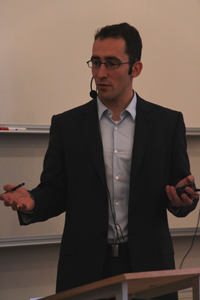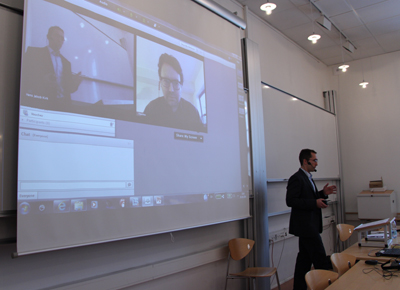PhD defence: A "legal revolution" in the European field of posting?
 The PhD dissertation A 'legal revolution' in the European field of posting - Narratives of uncertainty, politics and extraordinary events concerns the construction of the European Court of Justice's Laval ruling as a social, political and legal phenomenon. The Laval ruling has come to be a symbol of how the European Union is challenging workers’ rights, and as such it has been intensely debated in legal, political and scholarly circles.
The PhD dissertation A 'legal revolution' in the European field of posting - Narratives of uncertainty, politics and extraordinary events concerns the construction of the European Court of Justice's Laval ruling as a social, political and legal phenomenon. The Laval ruling has come to be a symbol of how the European Union is challenging workers’ rights, and as such it has been intensely debated in legal, political and scholarly circles.
The dissertation draws on the sociology of Bourdieu to reconstruct the symbolic struggles that caused this particular ruling to be regarded as a genuine ‘legal revolution’. Tracing the process meticulously, it is suggested that the huge symbolic impact of the ruling was not just caused by the content of the ruling or its material consequences; rather, the political context, the build-up of the case and the political aftermath have played decisive roles in making this ruling stand out as a symbol of how the European Court of Justice encouraged social dumping and downgrading workers' rights.
The dissertation traces the origin of the posting phenomenon within the EU and outlines the tensions inherent within it. While the free movement of workers has contested the member states’ monopoly on the legitimate forms of labour mobility within the EU, member states still retained the right to regulate the wages and working conditions of foreign workers in the manner they saw fit by applying the same rules as for domestic workers. However, this principle of ‘equal treatment’ between foreign and domestic workers was not applied to posted workers. The analysis shows how posted workers – workers employed in one country but sent abroad by their employer to work in another country – were gradually separated into a category of their own and potentially governed by principles other than that of ‘equal treatment’. Thus, the phenomenon of posting became a form of labour mobility under which it was somewhat unclear who could regulate the wages and working conditions of posted workers. While this issue has existed for decades, it was only after the most recent EU enlargements that posting became a highly controversial issue. The enlargement markedly increased socioeconomic differences within the EU and created great incentives to deviate from the principle of ‘equal treatment’. It is in this context that the Laval ruling – and three other rulings from the European Court of Justice – problematised the legitimacy of actions by trade unions and member states aimed at securing equal treatment for posted workers.

Jens Arnholtz defended his PhD dissertation on Friday the 31st of January 2014. In the assessment committee was Professor Peter Gundelach, Department of Sociology, University of Copenhagen (chairman), Professor Antonie Vauchez, Université Paris 1 – Sorbonne, France, and University Lecturer Nathan Lillie, University of Jyväskylä, Finland.
Read more about the dissertation
Contact:
Jens Arnholtz, e-mail: jh@faos.dk, phone: +45 35 32 32 14
Academic Books
 The PhD dissertation can be bought at Academic Books, Øster Farimagsgade 5, 1353 Copenhagen K.
The PhD dissertation can be bought at Academic Books, Øster Farimagsgade 5, 1353 Copenhagen K.
Hear the PhD defence
 Download Jens Arnholtz's PhD defence as mp3
Download Jens Arnholtz's PhD defence as mp3
